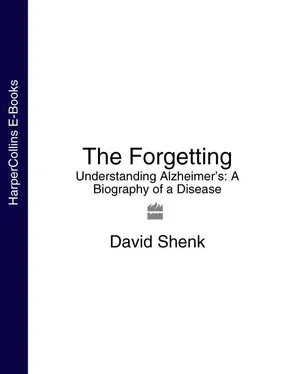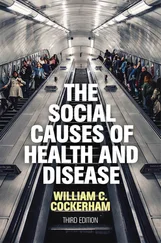The far-flung researchers kept in touch by E-mail, phone, and fax, and accomplished much in their labs spread out all over the world. Still, every so often, they needed to come together physically, to be in the same room to check their progress, to goad each other, critique and criticize each other, to energize.
In 1999, the gathering place was Taos. They came from everywhere, a global convergence of neuromolecular intelligentsia sitting on fold-out chairs in Bataan Hall to share knowledge and probe their ignorance. There was still so much they didn’t know: Why are women more susceptible to Alzheimer’s than men? Why are Cree and Cherokee Indians less susceptible than the rest of us? What is it about the environment in Hawaii, as contrasted with Japan, that apparently doubles one’s chances of getting Alzheimer’s? Why do a third of Alzheimer’s victims develop Parkinson’s disease but not the other two-thirds? Why do some cigarette smokers seem to be less likely to develop Alzheimer’s than nonsmokers?
After ninety-plus years, the field was littered with half-answers to these questions—and far more basic ones: Does Alzheimer’s have one cause or many? Is it really one disease or a collection of very similar diseases? Which come first—plaques or tangles? Why do they always originate in the same part of the brain? How long do they proliferate before they begin to affect brain performance? Why do some people accrue a brain full of plaques and tangles but never display any symptoms of the disease? Is anyone naturally immune to Alzheimer’s?
So, humbly, they gathered. With respect for the vexing nature of this disease, the molecular biologists and geneticists spent thirty hours listening to theories of plaque and tangle formation, and intervention strategies. After each short talk, they quickly lined up behind a microphone in the aisle to poke the presenter with questions, looking for holes in the research and analysis. The tone was alternately respectful and suspicious, and occasionally hostile.
Hostile because of the billions of dollars at stake, and also because of a fracturing debate within the community about which aspect of research mattered most. A nearly one-hundred-year-old question still had not been answered: Which are closer to the root of the problem—the plaques or the tangles?
Alois Alzheimer thought it was the tangles. “We have to conelude,” he wrote in 1911, “that the plaques are not the cause of senile dementia but only an accompanying feature.”
Most, however, now said the plaques. In a field where there were so many open questions and possible approaches, the vast majority of researchers in this room and elsewhere were focused tightly on the issue of plaque formation, while relatively few were concerned with tangles and only a handful of others busied themselves with important issues like inflammation, viruses, and possible environmental factors.
The disparity bothered many. “When I was a little girl, I wanted to go into science because I thought it was a very open community,” Ruth Itzhaki, a biologist from the University of Manchester, told me one morning in Taos. “I learned better. It is, in fact, a very cynical community layered with politics and filled with people who just want to follow the herd.” Itzhaki was herself embittered by her struggle to fund research linking the herpes simplex virus 1 (HSV1) with Alzheimer’s.
Could Alzheimer’s be herpes of the brain? It was not the most prominent theory of the day, but no one could rule it out. Nearly all humans are infected by HSV1 by the time they reach middle age. The virus mostly seems to lie dormant but can become active and create cold sores and other hazards in times of stress. Whether or not HSV1 does any damage depends largely on individual levels of immune response and on genetic makeup.
In her presentation, Itzhaki said she had found evidence of HSV1 presence in the temporal and frontal cortex of the brain, as well as in the hippocampus—three areas closely associated with Alzheimer’s. She posited that the virus might be interacting with a particular gene to set the disease process in motion. If proven true, a massive new global infant immunization project would be in order.
But the crowd in Taos did not seem very interested. Her talk drew little in the way of response. The focus quickly shifted back to plaques.
One evening I got a telephone call from a friend. He was telling me what a tough day he’d had on the job; he’d made several mistakes. “If you have Alzheimer’s, I must have a double dose of it,” he said .
I could feel myself entering a state of rage. “Do you forget simple words, or substitute inappropriate words, making your sentences incomprehensible? Do you cook a meal and not only forget you cooked it, but forget to eat it? Do you put your frying pan in the freezer, or your wallet in the sugar howl, only to find them later and wonder what in the world is happening to you? Do you become lost on your own street? Do you mow your lawn three or four times a day? When you balance your checkbook, do you completely forget what the numbers are and what needs to be done with them? Do you become confused or fearful ten times a day, for no reason? And most of all, do you become irate when someone makes a dumb statement like you just made?”
Конец ознакомительного фрагмента.
Текст предоставлен ООО «ЛитРес».
Прочитайте эту книгу целиком, купив полную легальную версию на ЛитРес.
Безопасно оплатить книгу можно банковской картой Visa, MasterCard, Maestro, со счета мобильного телефона, с платежного терминала, в салоне МТС или Связной, через PayPal, WebMoney, Яндекс.Деньги, QIWI Кошелек, бонусными картами или другим удобным Вам способом.












